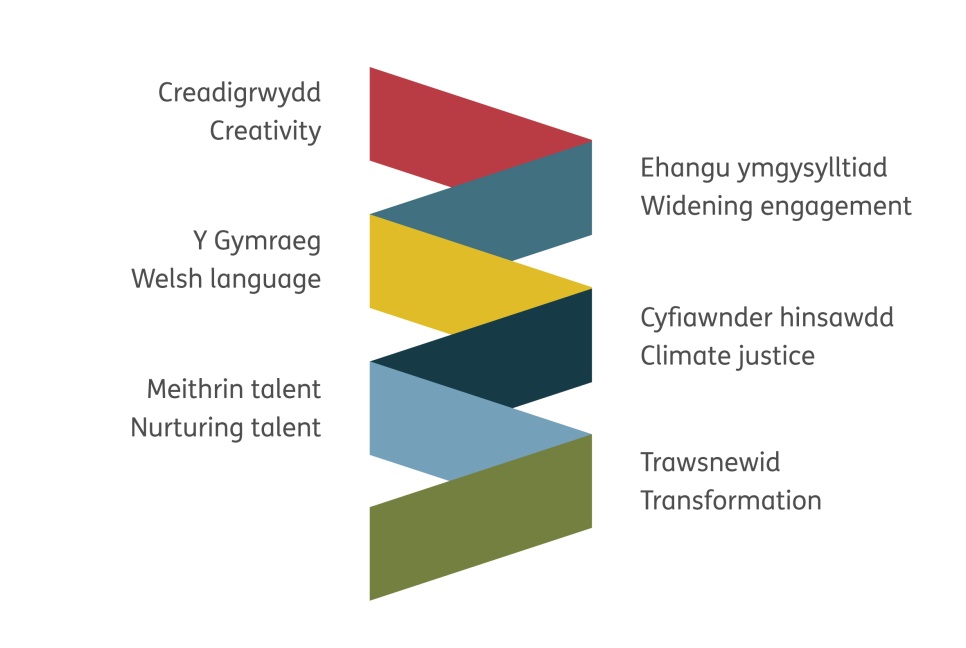Our Investment Review and its funding decisions will be driven by six principles, designed to reflect aspects of the sector that need positive change, action and evolution. But we will also need to take a Wales-wide view. There is a set of balancing factors that we’ll be taking into consideration when we look at the applications ‘in the round’.
The six principles
We arrived at these six principles after a period of reflection and consultation. They are closely informed by the Well-being of Future Generations Act and Welsh Government’s Cultural Contract and programme for Government. Although we describe each one uniquely, there is intersectionality between all six principles. The Investment Review’s application questions and assessment were centred on these six principles. We expect all funded organisations to be committed to their own journey of development across each area. The six principles are: Creativity; Widening Engagement; Welsh Language; Climate Justice; Nurturing Talent; and Transformation.
Creativity: art has the power to connect and help us understand each other and the world around us. It challenges our thinking and sparks our imagination. Created with integrity and aspiration, it brings joy and hope to audiences and participants.
Creativity is at the heart of everything and everyone we support. We want to see a wide variety of creative forms and practices created with communities and audiences in mind, which encourages artistic innovation. Art that means something to people.
Organisations are encouraged to experiment and take artistic risks but above all to develop work that is relevant, inclusive and made ethically.
Widening Engagement: reaching those communities who we consistently fail to engage. Arts and culture in Wales should reflect the lives of all its citizens and yet many people still face barriers and challenges to engaging with the arts.
Our approach to widening engagement should be one that recognises the intersectionality and the inter-connectedness of all those who face discrimination and disadvantage. It is one of zero tolerance to racism, ableism, homophobia and transphobia. We want to ensure that people from diverse communities are fully represented in the workforce, as leaders, decision-makers, creators, visitors, participants and audience members. The voices of those facing socio-economic deprivation must also continue to be heard and action must be taken to remove the many barriers and challenges that they face in creating and accessing the arts.
Widening engagement is also about Cultural Democracy – people and communities being empowered to shape and inform their own arts and cultural experiences and to be co-producers and co-creators in arts and culture that reflect their lived experience.
Welsh language: must be a thriving part of our creative lives. People of all backgrounds should be able to make, participate and experience arts in the Welsh language. This is because we believe everyone should have equal opportunity to access, take part, enjoy, and create art through the medium of Welsh, as well as bilingually, in Wales.
We will use the popularity, potential and influence of the arts to help the Welsh Government reach its ambition of a million Welsh speakers by 2050. We want all the organisations we support to develop and promote a sense of shared ownership for the Welsh language and its unique role within a bilingual and multilingual Wales.
We expect to see organisations maximise opportunities to learn, use and share Welsh language and culture; we want them to celebrate the story of the language and its evolution within the contemporary cultures and communities of Wales.
Climate justice: through action that is socially, environmentally, and ethically sustainable.
We all need to take ownership of the climate and nature emergencies. We believe that the arts, and the organisations we fund, can play an important role in addressing these emergencies. For example, we are working towards the Welsh Government targets of a net zero public sector by 2030 and a net zero arts sector by 2050 as part of the net zero Wales target.
We want to fund organisations who will join this collective journey of fully realising the potential of the arts to imagine, connect, and communicate the need for climate justice, and its power to affect change through values of empathy, solidarity and healing. In all our decisions, we will make ethical choices that consider the impact on people and planet, locally and globally.
Nurturing talent: for a healthy future for the arts. We all need to ensure that there are pathways that allow people from all backgrounds to develop creativity, skills, and leadership.
We want our funded organisations to recognise the breadth and depth of artists within the sector, and to understand that a successful and inclusive artistic ecology requires us to all work together. Investing in a diverse and Welsh-speaking workforce is a core part of this.
We want organisations to nurture skills and develop our future generations of cultural leaders and artists. We will look for evidence that organisations are creating new pathways and opportunities for continuous development, and that they are actively listening to their communities and young people. We want to see this done in a way that recognises the well-being of these individuals and with pay that is fair and equitable.
Transformation: seizing new opportunities and taking risks, being resilient and responsive to change, while remaining relevant to the people and communities of Wales.
Organisations that we fund must be committed to a healthy way of working and a positive culture, and ensure they are responsive, innovative, relevant and accountable. This doesn’t necessarily mean growth in economic terms; we will be considering how organisations make their decisions, what kind of evidence they are using, who they involve, and the inclusiveness of those decisions.
We are looking for organisations that lead the way in their field – supporting and partnering with individual artists, freelancers, and other bodies. It is also important that the funded organisations have robust and resilient governance and organisational structures to deliver on their plans, take and manage risks, and to identify areas that require assistance and support.

